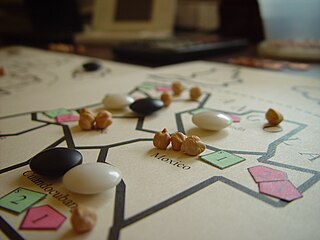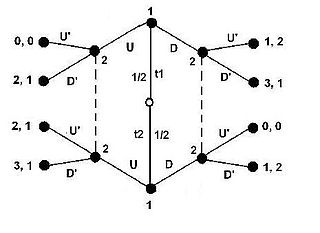 W
WThe Banzhaf power index, named after John F. Banzhaf III, is a power index defined by the probability of changing an outcome of a vote where voting rights are not necessarily equally divided among the voters or shareholders.
 W
WThe Bottle Imp is an 1891 short story by the Scottish author Robert Louis Stevenson usually found in the short story collection Island Nights' Entertainments. It was first published in the New York Herald and Black and White London. In it, the protagonist buys a bottle with an imp inside that grants wishes. However, the bottle is cursed; if the holder dies bearing it, his or her soul is forfeit to hell.
 W
WA chess opening or simply an opening refers to the initial moves of a chess game. The term can refer to the initial moves by either side, White or Black, but an opening by Black may also be known as a defense. There are dozens of different openings, and hundreds of variants. The Oxford Companion to Chess lists 1,327 named openings and variants. These vary widely in character from quiet positional play to wild tactical play. In addition to referring to specific move sequences, the opening is the first phase of a chess game, the other phases being the middlegame and the endgame.
 W
WCo-opetition: A Revolution Mindset that Combines Competition and Cooperation is a non-fiction book on coopetition, business strategy, and game theory by Adam M. Brandenburger and Barry J. Nalebuff. The book was initially published by Crown Business on May 1, 1996. As of 2015, the book is still available in its 9th printing.
 W
WA commitment device is, according to journalist Stephen J. Dubner and economist Steven Levitt, a way to lock yourself into following a plan of action that you might not want to do but you know is good for you. In other words, a commitment device is a way to give yourself a reward or punishment to make an empty promise stronger and believable.
 W
WTo compromise is to make a deal between different parties where each party gives up part of their demand. In arguments, compromise is a concept of finding agreement through communication, through a mutual acceptance of terms—often involving variations from an original goal or desires. Defining and finding the best possible compromise is an important problem in fields like game theory and the voting system.
 W
WConfrontation analysis is an operational analysis technique used to structure, understand and think through multi-party interactions such as negotiations. It is the underpinning mathematical basis of drama theory.
 W
WEvolution and the Theory of Games is a book by the British evolutionary biologist John Maynard Smith on evolutionary game theory. The book was initially published in December 1982 by Cambridge University Press.
 W
WIn combinatorial game theory, a two-player deterministic perfect information turn-based game is a first-player-win if with perfect play the first player to move can always force a win. Similarly, a game is second-player-win if with perfect play the second player to move can always force a win. With perfect play, if neither side can force a win, the game is a draw.
 W
WIn mathematics, a fixed point of a function is an element of the function's domain that is mapped to itself by the function. That is to say, c is a fixed point of the function f if f(c) = c. This means f(f ) = f n(c) = c, an important terminating consideration when recursively computing f. A set of fixed points is sometimes called a fixed set.
 W
WGame design is the art of applying design and aesthetics to create a game for entertainment or for educational, exercise, or experimental purposes. Increasingly, elements and principles of game design are also applied to other interactions, in the form of gamification. Game designer and developer Robert Zubek defines game design by breaking it down to its elements, which he says are the following:Mechanics and systems, which are the rules and objects in the game Gameplay, which is the interaction between the player and the mechanics and systems Player experience, which is how users feel when they’re playing the game
 W
WIn game theory and in particular the study of Blotto games and operational research, the Gibbs lemma is a result that is useful in maximization problems. It is named for Josiah Willard Gibbs.
 W
WIn probability theory, a martingale is a sequence of random variables for which, at a particular time, the conditional expectation of the next value in the sequence is equal to the present value, regardless of all prior values.
 W
WIn game theory a move by nature is a decision or move in an extensive form game made by a player who has no strategic interests in the outcome. The effect is to add a player, 'Nature', whose practical role is to act as a random number generator. For instance, if a game of Poker requires a dealer to choose which cards a player is dealt, the dealer plays the role of the Nature player.
 W
WA non-credible threat is a term used in game theory and economics to describe a threat in a sequential game that a rational player would actually not carry out, because it would not be in his best interest to do so.
 W
WParrondo's paradox, a paradox in game theory, has been described as: A combination of losing strategies becomes a winning strategy. It is named after its creator, Juan Parrondo, who discovered the paradox in 1996. A more explanatory description is:There exist pairs of games, each with a higher probability of losing than winning, for which it is possible to construct a winning strategy by playing the games alternately.
 W
WIn economics, perfect information is a feature of perfect competition. With perfect information in a market, all consumers and producers have perfect and instantaneous knowledge of all market prices, their own utility, and own cost functions.
 W
WA ratchet effect is an instance of the restrained ability of human processes to be reversed once a specific thing has happened, analogous with the mechanical ratchet that holds the spring tight as a clock is wound up. It is related to the phenomena of featuritis and scope creep in the manufacture of various consumer goods, and of mission creep in military planning.
 W
WIn game theory, a sequential game is a game where one player chooses their action before the others choose theirs. Importantly, the later players must have some information of the first's choice, otherwise the difference in time would have no strategic effect. Sequential games hence are governed by the time axis, and represented in the form of decision trees.
 W
WThe Shapley value is a solution concept in cooperative game theory. It was named in honor of Lloyd Shapley, who introduced it in 1951 and won the Nobel Prize in Economics for it in 2012. To each cooperative game it assigns a unique distribution of a total surplus generated by the coalition of all players. The Shapley value is characterized by a collection of desirable properties. Hart (1989) provides a survey of the subject.
 W
WSimultaneous action selection, or SAS, is a game mechanic that occurs when players of a game take action at the same time. Examples of games that use this type of movement include rock–paper–scissors and Diplomacy. Typically, a "secret yet binding" method of committing to one's move is necessary, so that as players' moves are revealed and implemented, others do not change their moves in light of the new information. Thus, in Diplomacy, players write down their moves and then reveal them simultaneously. Because no player gets the first move, this potentially arbitrary source of advantage is not present. It is also possible for simultaneous movement games to proceed relatively quickly, because players are acting at the same time, rather than waiting for their turn. Simultaneous action selection is easily implemented in card games such as Apples to Apples in which players simply select cards and throw them face-down into the center.
 W
WIn game theory, a solution concept is a formal rule for predicting how a game will be played. These predictions are called "solutions", and describe which strategies will be adopted by players and, therefore, the result of the game. The most commonly used solution concepts are equilibrium concepts, most famously Nash equilibrium.
 W
WIn economics and business decision-making, a sunk cost is a cost that has already been incurred and cannot be recovered. Sunk costs are contrasted with prospective costs, which are future costs that may be avoided if action is taken. In other words, a sunk cost is a sum paid in the past that is no longer relevant to decisions about the future. Even though economists argue that sunk costs are no longer relevant to future rational decision-making, in everyday life, people often take previous expenditures in situations, such as repairing a car or house, into their future decisions regarding those properties.
 W
WThinking Strategically: The Competitive Edge in Business, Politics, and Everyday Life is a non-fiction book by Indian-American economist Avinash Dixit and Barry Nalebuff, a professor of economics and management at Yale School of Management. The text was initially published by W. W. Norton & Company on February 1, 1991.
 W
WThe tragedy of the anticommons is a type of coordination breakdown, in which a single resource has numerous rightsholders who prevent others from using it, frustrating what would be a socially desirable outcome. It is a mirror-image of the older concept of tragedy of the commons, in which numerous rights holders' combined use exceeds the capacity of a resource and depletes or destroys it. The "tragedy of the anticommons" covers a range of coordination failures including patent thickets, and submarine patents. Overcoming these breakdowns can be difficult, but there are assorted means, including eminent domain, laches, patent pools, or other licensing organizations.
 W
WThe tragedy of the commons is a situation in a shared-resource system where individual users, acting independently according to their own self-interest, behave contrary to the common good of all users by depleting or spoiling the shared resource through their collective action. The concept originated in an essay written in 1833 by the British economist William Forster Lloyd, who used a hypothetical example of the effects of unregulated grazing on common land in Great Britain and Ireland. The concept became widely known as the "tragedy of the commons" over a century later after an article written by Garrett Hardin in 1968. In a modern economic context, "commons" is taken to mean any shared and unregulated resource such as the atmosphere, oceans, rivers, ocean fish stocks, or even an office refrigerator.